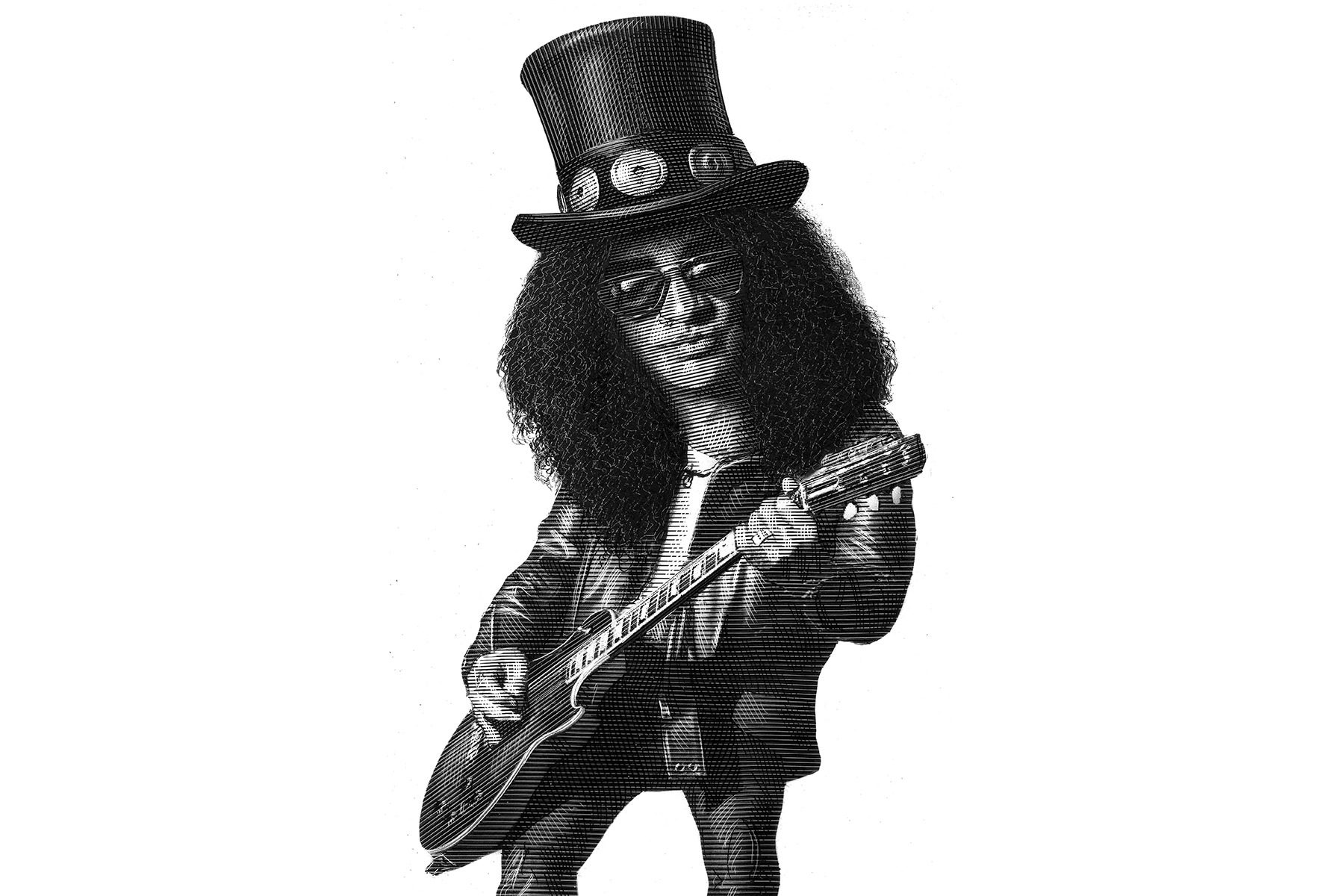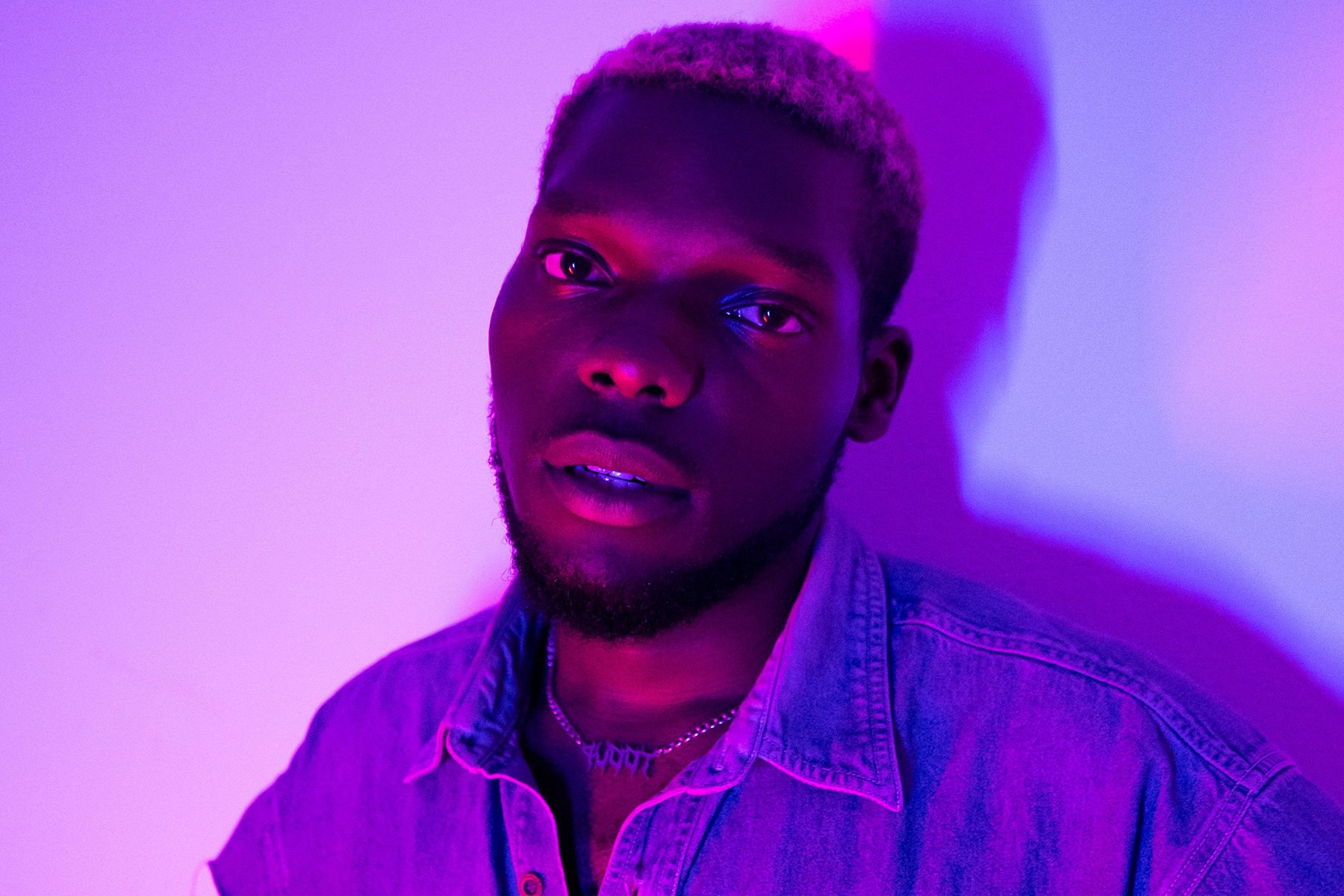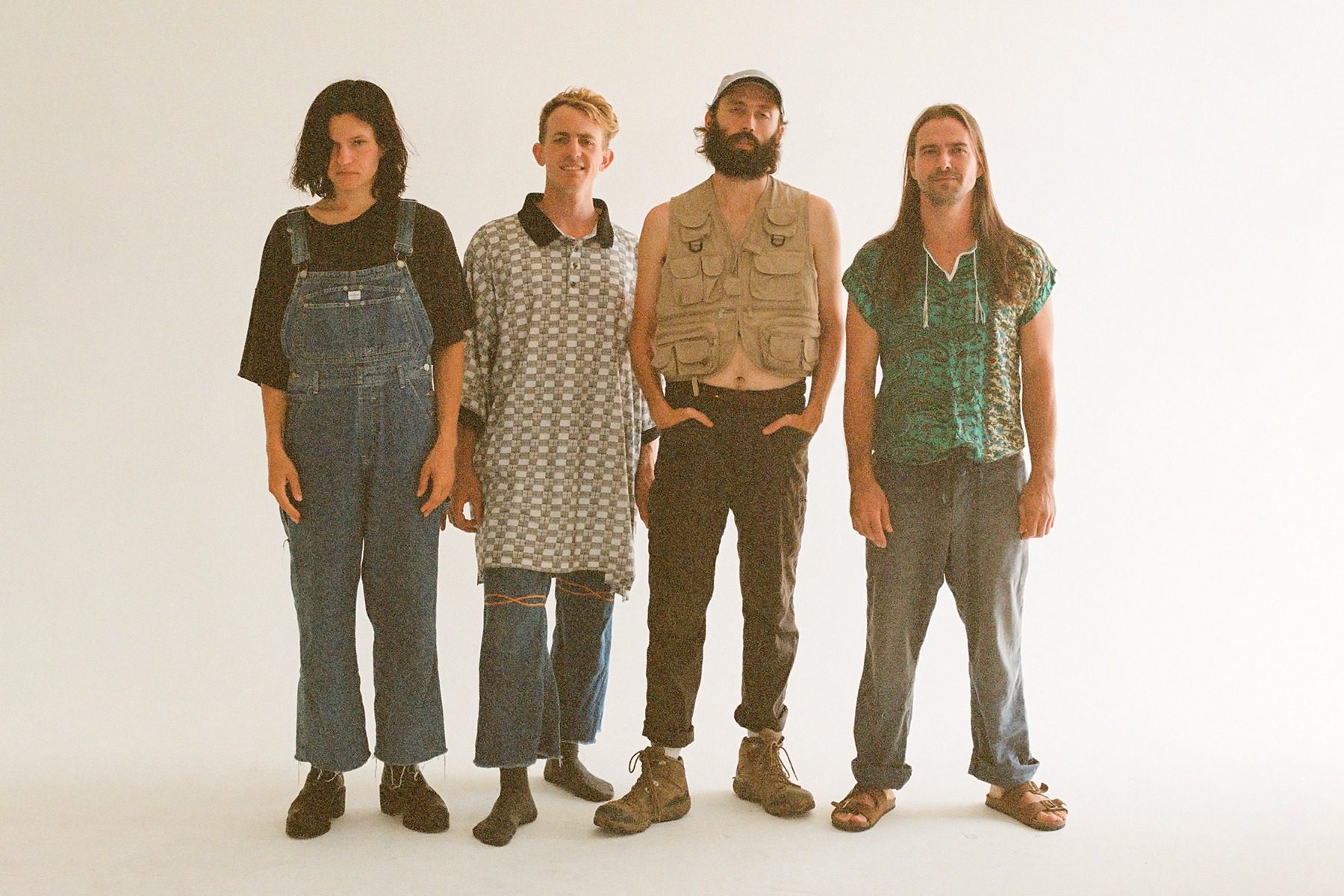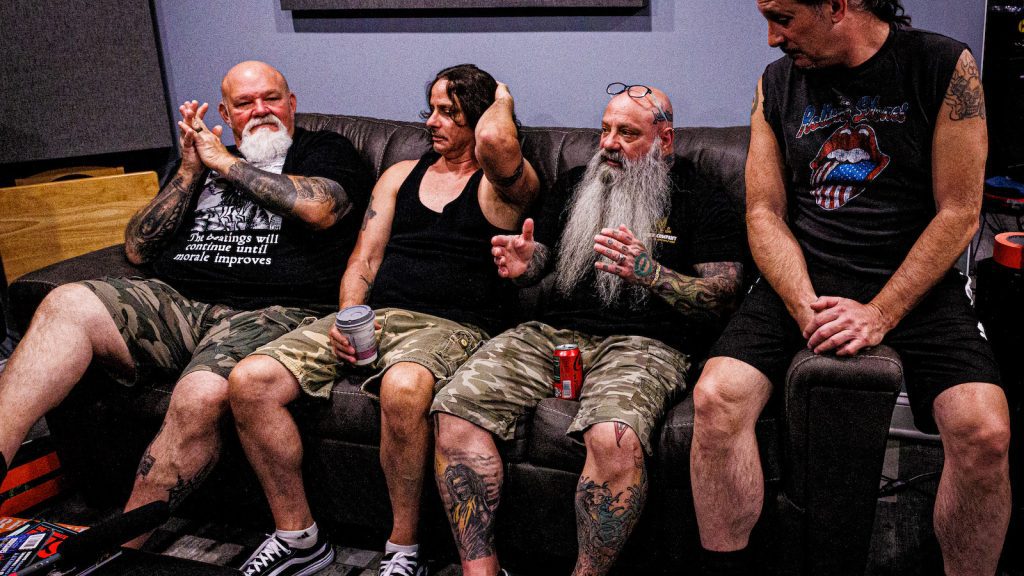
Slash on Keeping the Peace in GN’R and Seeing Rock ‘Go Down the F–king Tubes’
Slash won’t stop. Since reuniting with Guns N’ Roses in 2016, the top-hatted guitarist has toured regularly with both Guns and his own band, the one whose name is difficult to say in one breath: Slash featuring Myles Kennedy and the Conspirators. This month, he’s releasing new music by each group, 4 with Kennedy and the Conspirators, out today, and an EP, Hard Skool, with Guns on Feb. 25.
It’s taken a long time for Slash to get to this point. After spending his early years in his native England and decamping to L.A. with his family at a young age, he joined GN’R in 1985. He instantly settled into a unique approach to guitar, and his lyrical soloing and driving riffs helped make songs like “Welcome to the Jungle,” “Sweet Child o’ Mine,” and “November Rain” instant classics. In 1988, a year after its release, Appetite for Destruction quickly became the best-selling debut album of all time, and its follow-ups, the Use Your Illusion twins, showed what straight-ahead hard rock was capable of in the nascent grunge era.
blogherads.adq.push(function () {
blogherads
.defineSlot( ‘medrec’, ‘gpt-dsk-tab-article-inbody1-uid0’ )
.setTargeting( ‘pos’, [“mid-article”,”mid”,”in-article1″,”mid-article1″] )
.setSubAdUnitPath(“music//article//inbody1”)
.addSize([[300,250],[620,350],[2,2],[3,3],[2,4],[4,2],[640,250]])
;
});
After a brief solo outing with Slash’s Snakepit, he cut ties with Guns acrimoniously in 1996 but kept things rolling with Velvet Revolver, whose 2004 album Contraband went double platinum, before launching his own solo career. His path eventually led him back to reconciling with GN’R, and he kept his own group running, too. No matter which project he’s working with, he’s assured of his role.
“I just do my thing,” he explains on a call in mid-December. “Myles is doing the frontman part, but I think as a guitar player, I’ve been consistently out front a lot in all the bands I’ve been in anyway — but I’ve always been more or less the unspoken one. I play really loud, but I don’t really have a hell of a lot to say. And it’s the same in the Conspirators. The main difference is that it’s my band — or at least I coordinated it and put it together. It started out as ‘Slash’ when I did the Slash record in 2010, and then when Myles came on, I brought his name into it. And then Brent [Fitz, drums] and Todd [Kerns, bass] became the Conspirators, so that’s all included in the title — as hellishly long as it is — because I don’t want to be the sole focal point.”
Despite avoiding the spotlight, Slash has found himself centerstage time and again. Here, in IndieLand’s Last Word interview, he reflects on everything he’s learned so far.
You reunited with Guns N’ Roses five years ago, but you’re about to release your second solo album since then. What do you get out of leading your own band at this point?
None of the other bullshit that goes with being in a rock & roll band and having recognition and having this and that and the other, and all the stuff that people get so preoccupied with — none of that exists in [the Conspirators]. All anybody wants to do is get together, play, record, and go out and tour. I just keep it going because we have a good time doing it, and it’s really stress-free.
The opening guitar line to “Fall Back to Earth,” which closes out your new album 4, sounds absolutely devastating. How do you find the mindset to write something like that?
I went on a safari in South Africa at Kruger National Park, and I took my guitar with me. I don’t want to sound corny, but the vibe out there is just beautiful hanging outside at night, and that very majestic kind of sky. That melody just came to me, and I figured that has to be some sort of a sign because it really flowed out. It was very much influenced by the environment.
blogherads.adq.push(function () {
blogherads
.defineSlot( ‘medrec’, ‘gpt-dsk-tab-article-inbody2-uid1’ )
.setTargeting( ‘pos’, [“mid-article2″,”mid”,”in-article2″,”mid-article”] )
.setSubAdUnitPath(“music//article//inbody2”)
.addSize([[300,250],[300,251],[620,350],[2,4],[4,2],[3,3],[2,2]])
.setLazyLoadMultiplier(2)
;
});
You worked with producer Dave Cobb, who’s known for making country records, on 4, but your record is very rock & roll. How did your and his aesthetics complement each other?
I talked to a couple people looking for who would be considered a good rock & roll producer these days. I know they’re few and far between. And lo and behold, I was right. I ended up with a list of four and one of them was Dave Cobb.
Although country music’s not necessarily what I do, I have an appreciation for the soul of it, and I love old-school country music. The cool thing about Dave is that his country — as contemporary as it is — is very stripped down, very human, very sort of raw and emotional. So I dug that, but then really to top it off, he had done [an album for] Rival Sons, which I thought was one of the better-sounding modern rock bands that’s come out.
In our conversation, he talked about how much he’s been wanting to record a rock & roll band live. And I was like, “Dude, I’ve been trying to record a live rock & roll record for years. No producer will let me.” So we hit it off right then and there. We fucking loaded in and started jamming the moment we got there. And he just stayed in the room with us, and we played. [Recording that way] was a really cathartic experience for me.
Rock & roll isn’t as popular as it once was. Have you ever been tempted to change things up?
I’m a rock & roll guy through and through. That’s how I started. That’s what turned me on. And that’s what I gave up everything for. It’s in my blood. I don’t give a shit what the fuck’s going on elsewhere; that’s what I do. As a musician and as an artist who appreciates a lot of different music, there’s a lot of people making records that are great; it doesn’t have to be rock & roll.
But as far as the industry is concerned, I never gave a shit what was popular. Now that rock & roll is not doing the numbers that it once did, I’ve seen the whole integrity of rock & roll as a genre fucking go down the tubes because of the money and the fucking grandeur of the whole industry for rock & roll at the time when it got to be really huge. After the Nineties and when MP3s and file sharing started happening and after everybody started wanting to be seen [without caring] about what the people were hearing, it has taken a nosedive. So at this point in time, I just like to stick to my guns and try and be the best at what I love to do and do what I would want to hear.
It is interesting now because of the way that the industry has sort of turned, and rock & roll as a commercial entity sort of cannibalized itself. Now that there’s nothing, there’s no money in it. Now kids are discovering it and fucking just doing it for the pure passion of doing it. And it’s fucking great. The energy of it is brilliant. And so that’s exciting to me. So all things considered, while everyone else is doing whatever, I’ve always just been trying to hone my own craft.
blogherads.adq.push(function () {
blogherads
.defineSlot( ‘medrec’, ‘gpt-dsk-tab-inbodyX-uid2’ )
.setTargeting( ‘pos’, [“mid”,”mid-articleX”,”in-articleX”,”mid-article”] )
.setSubAdUnitPath(“music//article//inbodyX”)
.addSize([[300,250],[300,251],[3,3],[620,350],[2,2]])
.setLazyLoadMultiplier(2)
;
});
You were born in Hampstead, London. What’s the most English thing about you?
More than anything, it’s this crazy patriotism I have for England. It seems to run through all Brits; it’s in the DNA or something, even though I’ve been living in the States for fucking 40-some-odd years. The rest of it’s just little things that haven’t really gone away: Certain words that I use — I say “aunt” instead of [the Americanized pronunciation “ant”] — or my love for an English breakfast.
Your mother designed costumes for David Bowie, John Lennon, and Janis Joplin. What did she teach you about style?
There was never a conversation that I can recall having with my mom about fashion and style, so I must have picked up something subconsciously about clothing. I ended up being the kid that just wears T-shirts and jeans, and I never really evolved past that. But I do like leather pants. I remember she made me one of the coolest pairs of leather pants I ever had, which I fucking traded for smack like an idiot years later. But I definitely picked up certain style elements subconsciously.
“I’m a rock & roll guy through and through. … I don’t give a shit what the fuck’s going on elsewhere; that’s what I do.”
Your mother was Black, and your father is white. How did you find your identity growing up?
When I was coming up, I was a real misfit. When I first moved to this country, I had a really thick Northern [British] accent. I had long hair. I wore T-shirts that said shit on them and jeans with holes in them. I just didn’t fit in. At school, it was very straight white kids. But the primarily Black side of my family lives in South Central L.A., and I [felt] too white [laughs]. It was hard. I didn’t really ever feel totally comfortable in my own skin.
Then I picked up the guitar in seventh or eighth grade, and that changed things. All of a sudden I was “cool” because I was standoffish or aloof. And from that point on, it didn’t really matter what color anybody was — except for when you’re looking for other people to work with in a band and your skin’s darker than them. There’s definitely vibes that you could pick up along the way. But it’s just all part of life, and you just sort of go with it.
I never really took it too personally. I just sort of identified with not being anything in particular [laughs].
blogherads.adq.push(function () {
blogherads
.defineSlot( ‘medrec’, ‘gpt-dsk-tab-inbodyX-uid3’ )
.setTargeting( ‘pos’, [“mid”,”mid-articleX”,”in-articleX”,”mid-article”] )
.setSubAdUnitPath(“music//article//inbodyX”)
.addSize([[300,250],[300,251],[3,3],[620,350],[2,2]])
.setLazyLoadMultiplier(2)
;
});
At this point in your life, where does Slash end and Saul Hudson begin?
I started being called Slash in ninth grade. Now it feels weird if anybody calls me Saul, because the last person to really call me Saul was my late grandmother. But I keep it on my driver’s license, my passport, and all my legal documents. Because it’s better not to be “Slash” in that context.
What’s the secret to keeping the peace in Guns N’ Roses these days?
Just keeping it to ourselves. The biggest issue was that as the band got huge, as street-smart as I’d love to say the band was at the time, [music-business people] really inserted themselves in between our regular relationships and had a real negative effect on things. It ended up causing me to leave, and then being as stubborn as I am, I didn’t look back.
Overall, what’s been the best part about getting back with GN’R?
I think the biggest thing was getting past this horrible black cloud that was perpetuating, having to do with me and Axl. We had a lot of issues born out of third-party stuff. It was very insidious, and the longer we didn’t talk, the more it got blown out of proportion. But the more significant part was, when Axl and Duff and I first got into a room playing, it was just like this fucking thing that I can’t even really verbally describe. It was like, “Whoa, that’s what that is.” Then, just to go out and play together, it’s like, I wonder how the fuck we got into that mess that we were in in the Nineties.
Guns N’ Roses recently released “Absurd” and “Hard Skool” — your first songs with the band in more than 25 years. How do you know when a song is ready to come out?
“Hard Skool,” in essence, was a completed song when I was first introduced to it. And Duff and I went in and redid the bass and the guitars. It’s a simple song, so it didn’t take a hell of a lot of thought and analysis. I think it was a lot of fun just because it was part and parcel of a bunch of stuff that we were working on that was all sort of new — at least to Duff and I — so we had a good time. There’s a bunch of new stuff also coming, maybe a little bit more complex, but it’s just as much fun.
Does that mean there’s a new album coming?
I know we’ve got some songs and we’re releasing another one at some point soon, and there’ll be another one after that. As far as the record is concerned, that remains to be seen as far as a whole package, but I feel pretty confident that at some point down the road, there will be.
GN’R were once the “most dangerous band in the world.” What have you learned from being in a controversial band?
One of the things I’m proud of with Guns N’ Roses is that we did everything the way we wanted to do it and we never catered to the industry or anybody else’s political correctness. If it made us controversial, it really didn’t matter because we felt true to ourselves, and we felt good about it. That was an inherent part of the band from before we had a record deal: Everywhere we went, we sort of caused chaos and mayhem and didn’t do things in a conventional or socially acceptable way. I always thought that’s just part of being in a band. Nowadays I think everything’s been fucking done and tested, so there’s not a lot that we can do, but it was never intentional anyway.
blogherads.adq.push(function () {
blogherads
.defineSlot( ‘medrec’, ‘gpt-dsk-tab-inbodyX-uid4’ )
.setTargeting( ‘pos’, [“mid”,”mid-articleX”,”in-articleX”,”mid-article”] )
.setSubAdUnitPath(“music//article//inbodyX”)
.addSize([[300,250],[300,251],[3,3],[620,350],[2,2]])
.setLazyLoadMultiplier(2)
;
});
You mentioned earlier trading the leather pants your mom gave you for heroin. Do you have any regrets from those days?
I mean little things like pants, a couple guitars I hocked. But you just move on. I was very lucky in all my insanity to have never caused anybody any real physical harm or got drunk and did any permanent damage. So I really don’t believe in regrets because shit happens.
You’ve been sober for many years now. What advice do you have for people looking to clean up?
In my experience, it was hard to get to that point where … I think the word they used in AA is “surrender” to your situation. You resign to the fact that you do have these issues and you need to sort them out or find somebody to help you. It takes forever to get to that point because it was all fun and games until all of a sudden it wasn’t, and you don’t understand necessarily why that is. The biggest thing is to come to terms with all that, and then finally arrive at the decision that you need to change things. You have to be honest with yourself, and then things will happen for you. But the one thing I can say is you can’t continue on the way that you were. Because you would either end up dead or in jail. There’re no options other than that.
I’ve been through some shit where I shouldn’t be here, so it’s made me appreciate being here and loving what it is that I do. And I’m just really happy that I managed to get it together before it damaged me in a permanent way that I would never be able to come out of. But I have no regrets about all that either, though; I mean, I loved all that shit. It was fun at the time and all that, but there did come a point.
What’s the most indulgent purchase you’ve ever made?
Well, you’re talking to the owner of some 400 guitars. It’s a lot of fucking guitars. I keep acquiring them if not buying them, so that’s pretty much it. Other than that, I don’t have a lot of expensive material things. I have two cars. So I can’t say that I’m overly indulgent in any other way, but the guitar thing is a little bit of an addiction. And I’ve amassed a lot of guitars over the years, and I still buy them. At some point in time, I do use everything. But it does seem like a lot of guitars. When David Gilmour and Eric Clapton were selling theirs, I thought, “Hmm. That’s interesting. I wonder what that feels like. Is that liberating, or what?”
Your guitar solos have always had a singing quality to them. What’s the secret to a good lead?
A lot of people are so self-indulgent when they do solos that the solos they do don’t have anything to do with the song; they just jam, fucking play all their licks. And the fact that you would say it’s melodic enough to be sing-songy means that [my playing is] within the structure of the melodic trajectory of the song. I think that’s a good thing. I always loved guitar solos, but I always loved them within the context of the material, not so much when somebody’s just standing onstage playing a whole bunch of stuff by himself. I really sort of like a guitar solo as it affects the song.
blogherads.adq.push(function () {
blogherads
.defineSlot( ‘medrec’, ‘gpt-dsk-tab-inbodyX-uid5’ )
.setTargeting( ‘pos’, [“mid”,”mid-articleX”,”in-articleX”,”mid-article”] )
.setSubAdUnitPath(“music//article//inbodyX”)
.addSize([[300,250],[300,251],[3,3],[620,350],[2,2]])
.setLazyLoadMultiplier(2)
;
});
You have a very recognizable look. How do you navigate going out in public when everyone would notice you?
For the most part I can cruise around. I’m not Britney Spears. Some people will recognize me — especially if we’re in the city that we’re playing. But for the most part I’m pretty low key. I hate to draw attention to myself. So I just sort of slip in and out of places and I don’t get too many people coming after me. But the other thing about that is, it’s hard to be someone who’s bitter or complaining about a dynamic that happens when you put out a product and people like it enough that they will recognize you from it. Even if it’s inconvenient, you have to sort of just go with it.
Is there a downside to success, then?
The only real downside is not knowing how to handle it or how to behave as a result of having success. I think I went through a lot of that. Probably what I learned from my experience over the years is I just keep to myself, and I don’t actually go out that much. I don’t mind being recognized when I’m playing at a show. Great. But I find that I tend to keep to myself when I’m home in L.A. Or if I’m on the road, I don’t go looking for people to. And I think that’s just from years of finding that I’m not really that good at it. Some people are very outspoken and love to be the center of attention. I’m just not that guy.




